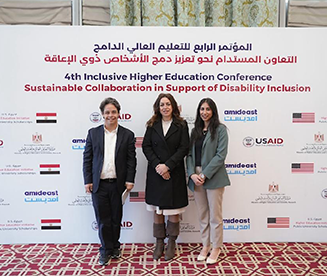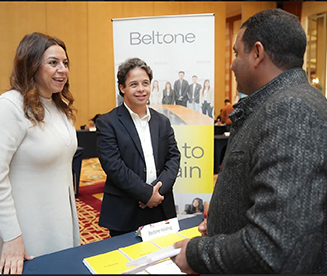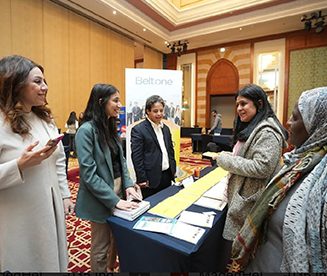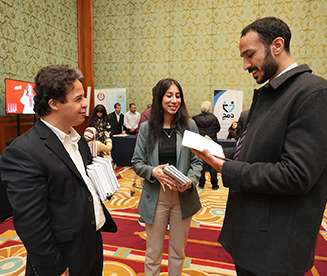
Sustain and Shine
February 2024
Sustainability Message by
Dr. Ibrahim Safwat
Deputy Group Chief Executive Officer

As we gather the threads to weave our February sustainability newsletter, I am filled with both pride and a profound sense of responsibility. Sustainability is not just a buzzword for Beltone Holding; it represents the core philosophy that guides our corporate strategy and touches every aspect of our operations. It is a commitment to the planet, to our communities, and to future generations, ensuring that their potential is not compromised by the limitations of today’s resources.
Our proactive approach towards sustainability is both a duty and a strategic thrust that we willingly embrace. In this edition of our newsletter, you will witness the breadth of our endeavors, the depth of our commitment, and the tangible results of our collective action. These stories are not just reports; they are narratives of change and progress that you, our dedicated team, make possible. This month, we highlight the strides we have taken as a group to reduce our environmental impact. From reducing waste in our operations to investing in energy-efficient practices and technologies, we have centered our business goals on sustainable growth.
We celebrate the partnerships we have fostered with like-minded organizations and the innovative solutions that have emerged from such collaborations.
We also shine a light on the educational and community outreach programs we have engaged in to raise awareness about sustainability. I am a firm believer that informed individuals contribute more effectively towards collective goals. Thus, our mission transcends our corporate boundaries and speaks to the heart of the society we are integral to.
Sustainability is a journey we embark on together, and each step we take is a building block for a more resilient and mindful organization. Take pride in the role you play, and let us carry this momentum forward, not just as professionals within Beltone Holding, but as proactive citizens in the world we aim to preserve and enhance.
Thank you for your enduring efforts and enthusiastic participation in our sustainability programs. Together, we are not only shaping the future of our company but also contributing to a more sustainable world for all.
Who I am!
Carpooling Initiative
As part of our sustainability initiatives, we are currently planning to introduce a dedicated carpooling app exclusively for the Beltone community.
Stay Tuned!

Paperless Initiative
Electronic Business Cards

As part of our paperless initiatives, we have successfully implemented and distributed electronic business cards to all Beltone employees. This digital alternative serves several purposes, including:
- E-business card utilizing NFC technology. With a simple tap on a smartphone, you’ll instantly access contact details.
- Access card for Beltone premises gates.
- Identification card for Beltone employees, providing access to affiliated merchants’ benefits.
Our New Campaign
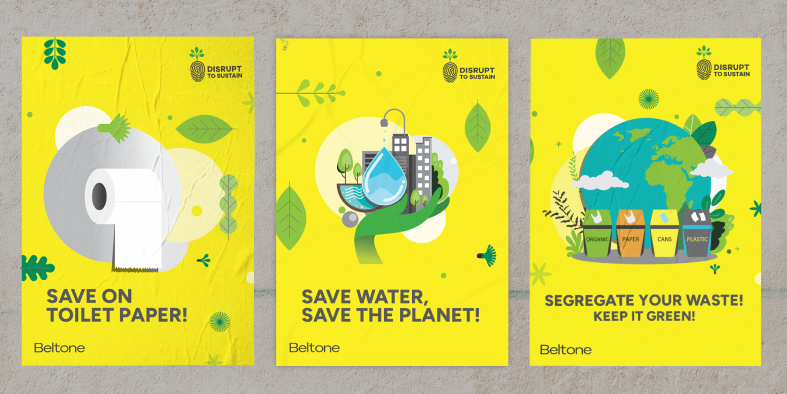
Embark on a journey of sustainability awareness with us!
Explore our carefully crafted awareness posters distributed in the toilets, guiding you through key practices that contribute to a greener future.
And don’t miss out on the captivating videos playing on screens strategically located in our reception area. Immerse yourself in visual storytelling that brings to life the impactful strides we’re making towards sustainability.


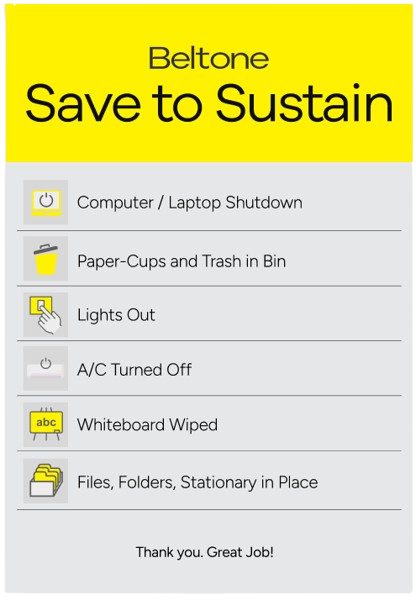
End of Day Checklist
As part of our unwavering dedication to cultivating a sustainable work environment, we have implemented an End-of-Day Checklist in every office and open space. This checklist encompasses a range of responsible practices that we strongly encourage all employees to follow. By adhering to this checklist, we collectively contribute to minimizing our environmental footprint. These are the main elements in the End of Day checklist:


Double-sided Printing

Print Mindfully




Embrace Digital Documentation through Oracle and Microsoft Teams

Successful Business Meeting with seven
Following our series of meetings with each line of business aimed at enhancing sustainability and ESG at Beltone. The meeting with Beltone’s Consumer Finance Subsidiary “seven” proved to be particularly successful.

- During this meeting, seven promptly shared valuable insights regarding the percentages of their clients’ impact investments in the Solar, Healthcare, and Education sectors. This information plays a critical role in comprehending the composition of their client base and assessing its alignment with the Group’s sustainability objectives.
- Furthermore, seven demonstrated a high level of openness and willingness to engage in sustainability initiatives. This collaborative mindset and proactive approach further represent their willing to driving positive change.
Sustainability Team Spotlight
1. Beltone’s Sustainability team participated in a panel discussion on Empowering Leadership in the Era of AI and Sustainability.
On 16th January 2024, Beltone’s Sustainability team had the honor to participate in a round table discussion on “Empowering Leadership in the Era of AI and Sustainability” with H.E. Dr. Hala El-Said, Egypt’s Minister of Planning & Economic Development. This round table was in collaboration with the National Institute for Governance and Sustainable Development and the Federation of Egyptian Industries – FEI.
2. Beltone’s Sustainability team presence in the Disability Inclusion Conference
On 3rd February 2024, Beltone has been invited to participate in the 4th Inclusive Higher Education Conference: Sustainable Collaboration in Support of Disability Inclusion. At Beltone, we firmly believe in the potential and capabilities of people with disabilities. We recognize that they possess unique talents and abilities that simply require opportunities to flourish. Consequently, we actively seek out opportunities to attend and support events that champion their inclusion and empowerment.
Proud Moment
Today, we are delighted to celebrate the graduation of our esteemed colleague, Sama Ramy, from the Faculty of Logistics at the Arab Academy for Science, Technology, and Maritime Transport. Sama, who possesses exceptional talent and determination, represents one of the brilliant members of our Train to Sustain initiative. This occasion calls for celebration and recognition of Sama’s remarkable achievements.


Do right by the leftovers Recycle leftovers to make a different Iftar meal the next day. The best way to store leftovers is using glass boxes instead of aluminum foil/plastic boxes to keep it fresher.
Buy local products instead of imported products to prepare Iftar meals and Suhoor.
There are several easy ways to reduce waste during Ramadan:
- Take reusable bags with you when you go grocery shopping to prepare Iftars.
- If you’re renovating, you can repurpose and repaint old furniture to give them a second life.
Good to Hear!
Transforming food system to realize benefits of $ 10 trln, save 174 million lives

Adopting an alternative Food System Transformation approach could eradicate undernutrition by
2050
A recent economic analysis by researchers from the University of Oxford and London School of Economics reveals that transforming the global food system could yield annual benefits of up to $10 trillion. The costs associated with this transformation are relatively small in comparison.
and save lives from diet-related chronic diseases.


This approach also has the potential to make food systems net carbon sinks by 2040, limit global warming to below 1.5 degrees, protect 1.4 billion hectares of land, reduce nitrogen surplus, reverse biodiversity loss, and provide sufficient income to 400 million farm workers worldwide. These findings emphasize the significant positive impact that sustainable actions within the food system can have.



